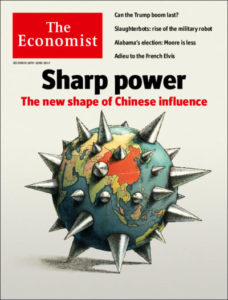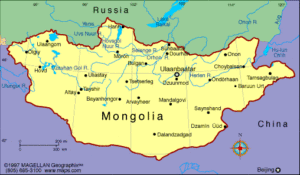Globally, China’s reputation has deteriorated significantly since 2012 stemming from a perception of financial, diplomatic, and military bullying as well as blowback from the increasingly naked geostrategic ambitions of the current regime, notes Jude Blanchette, Freeman Chair in China Studies at the CSIS.
 The European Union, for example, has realized that it needs a serious strategic partnership with Beijing to match the country’s muscular global ambitions, Carnegie’s Judy Dempsey writes. China has evolved from a manufacturer of cheap goods to a powerful economic and political competitor. The EU’s founding principles of democracy and civil liberties contrast starkly with China’s one-party system, and its use of AI and cyber security tools.
The European Union, for example, has realized that it needs a serious strategic partnership with Beijing to match the country’s muscular global ambitions, Carnegie’s Judy Dempsey writes. China has evolved from a manufacturer of cheap goods to a powerful economic and political competitor. The EU’s founding principles of democracy and civil liberties contrast starkly with China’s one-party system, and its use of AI and cyber security tools.
The latest case of China’s sharp elbows sees the Communist regime pressuring Mongolia over the issue of the Dalai Lama’s reincarnation, posing a threat to its neighbor’s democracy and sovereignty.
When the Tibetan spiritual leader visited the country in 2016, Beijing blocked trade and forced the government to agree there would be no future visits, notes Michael J. Green, senior vice president for Asia at the Center for Strategic and International Studies and a professor at Georgetown University. Now, Beijing is quietly threatening further sanctions if Mongolia does not turn to the Chinese Communist Party’s eventual choice of the next Dalai Lama—something devout Buddhists in the country would never accept, he writes for Foreign Policy:
 When Mongolian President Khaltmaagiin Battulga announced a strategic partnership with the United States during a visit to Washington in July, Chinese media warned that Mongolia would inevitably fall under Chinese suzerainty, and a handful of political leaders in Ulaanbaatar unexpectedly condemned the government’s enhanced friendship with Washington—criticism that many in the Mongolian government believe was funded by Beijing in a pattern of political interference seen elsewhere in Asia.
When Mongolian President Khaltmaagiin Battulga announced a strategic partnership with the United States during a visit to Washington in July, Chinese media warned that Mongolia would inevitably fall under Chinese suzerainty, and a handful of political leaders in Ulaanbaatar unexpectedly condemned the government’s enhanced friendship with Washington—criticism that many in the Mongolian government believe was funded by Beijing in a pattern of political interference seen elsewhere in Asia.
The U.S. should help Mongolia stand up to China’s bullying, adds Green, who served as the senior National Security Council official on Asia policy during the George W. Bush administration. (Follow him on Twitter: @JapanChair).
Mongolia’s recent anti-corruption measures have been welcomed by Transparency International.
“At the same time, however, the Mongolian Parliament appears to be attempting to reduce civic space, freedom of expression, association, assembly, and civil society’s access to resources through newly proposed draft laws on non-profit legal entities, political parties and social media,” TI cautions. “Undermining the constitutional foundations of plural democracy, fundamental freedoms and the rule of law will lead to increased corruption and impunity.”
 Chinese authorities have tightened controls in Tibet ahead of Oct. 1 celebrations of China’s National Day, hoisting Chinese flags on monastery roofs and forcing monks to sing songs praising the ruling Communist Party (see above), a Tibetan advocacy group said in a report, RFA reports:
Chinese authorities have tightened controls in Tibet ahead of Oct. 1 celebrations of China’s National Day, hoisting Chinese flags on monastery roofs and forcing monks to sing songs praising the ruling Communist Party (see above), a Tibetan advocacy group said in a report, RFA reports:
 In the run-up to the 70th anniversary of the founding of the People’s Republic of China, Tibetans are also being coerced to attend events promoting government policies and are hanging scrolls with pictures of senior Chinese Communist Party leaders on the walls of private homes, London-based Free Tibet said.
In the run-up to the 70th anniversary of the founding of the People’s Republic of China, Tibetans are also being coerced to attend events promoting government policies and are hanging scrolls with pictures of senior Chinese Communist Party leaders on the walls of private homes, London-based Free Tibet said.
China’s aggressive assertion of what the National Endowment for Democracy calls “sharp power” is generating international blowback. Australia, for instance, has witnessed a marked rhetorical shift from “Chinese influence” to “Beijing interference.”







